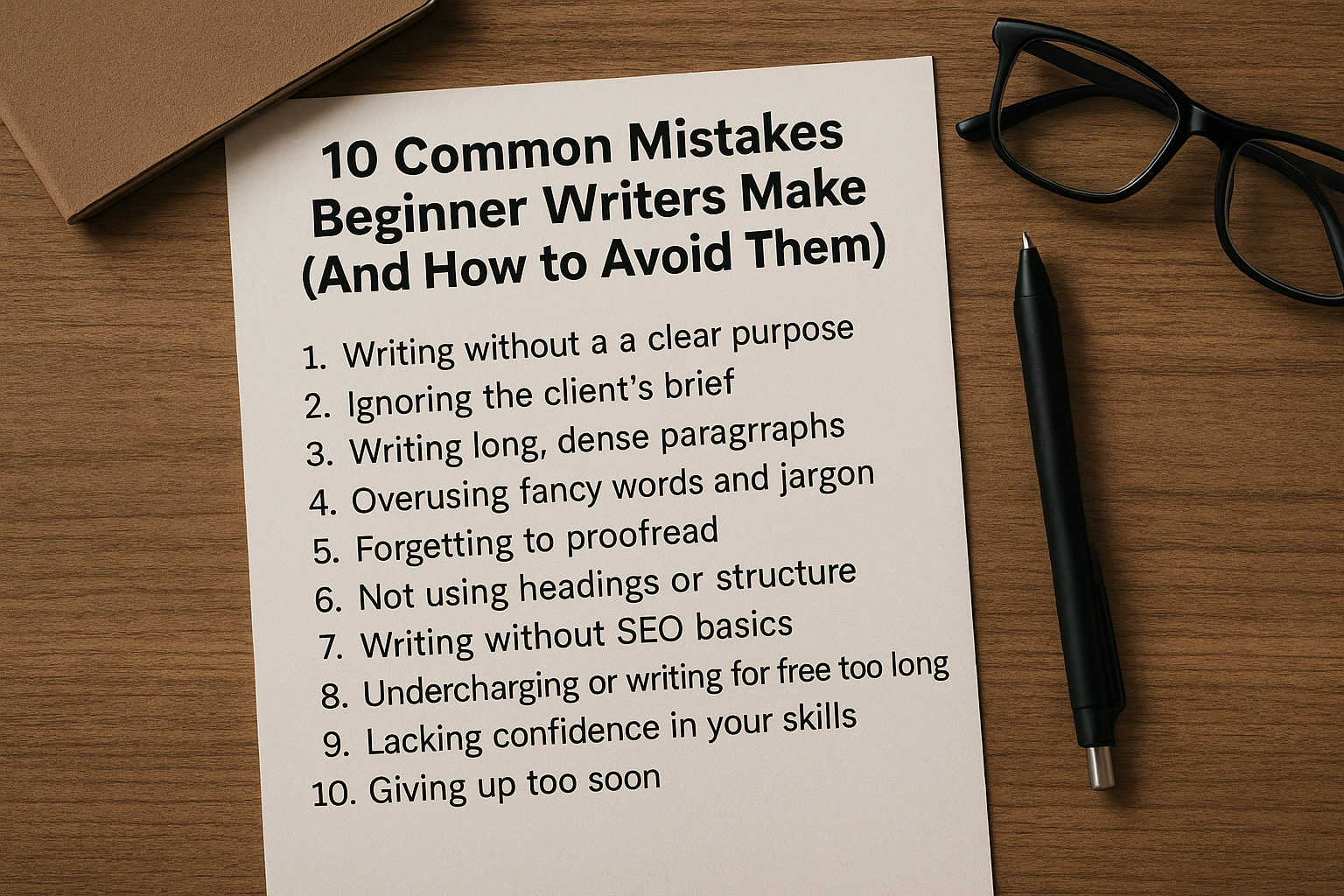Starting your freelance writing journey is exciting — but also full of potential pitfalls. As a beginner, it’s normal to make mistakes, especially when you’re trying to learn everything at once. However, knowing what to watch out for can save you time, energy, and missed opportunities.
In this article, we’ll break down 10 common mistakes beginner writers make and how you can avoid them to grow your skills and client base faster.
1. Writing Without a Clear Purpose
The mistake: Jumping into writing without knowing why you’re writing or who you’re writing for.
Why it matters: Without a purpose or target audience, your writing lacks focus — and readers (or clients) will feel it.
How to avoid it:
Before you write, ask yourself:
- Who is this for?
- What problem am I solving?
- What’s the goal of this content?
Always write with intention.
2. Ignoring the Client’s Brief
The mistake: Skimming the client’s instructions or overlooking key requirements.
Why it matters: Misunderstanding the brief leads to rewrites, delays, and frustration — for both you and the client.
How to avoid it:
- Read the brief carefully (twice).
- Highlight or note specific instructions.
- Ask questions if something is unclear.
- Follow formatting, tone, and word count guidelines exactly.
3. Writing Long, Dense Paragraphs
The mistake: Using big blocks of text that are hard to read, especially online.
Why it matters: Online readers skim. If your paragraphs look overwhelming, they’ll skip your content.
How to avoid it:
- Use short paragraphs (2–4 lines max).
- Break up text with headings, bullet points, and white space.
- Use clear transitions between ideas.
4. Overusing Fancy Words and Jargon
The mistake: Trying to sound “smart” by using complicated language or industry jargon.
Why it matters: Clear writing connects. Overcomplicating your message turns readers away.
How to avoid it:
- Use simple, conversational language.
- Prioritize clarity over complexity.
- Write like you’re explaining something to a friend — not a professor.
5. Forgetting to Proofread
The mistake: Submitting content with typos, grammar errors, or formatting issues.
Why it matters: Mistakes make you look careless — and may cost you repeat work.
How to avoid it:
- Use tools like Grammarly or Hemingway Editor.
- Read your text aloud before submitting.
- Take a break between writing and proofreading for fresh eyes.
- Double-check names, dates, and links.
6. Not Using Headings or Structure
The mistake: Delivering a “wall of text” with no clear sections or flow.
Why it matters: Clients (and readers) expect structured, easy-to-navigate content.
How to avoid it:
- Use H1 for the title, and H2/H3 for subheadings.
- Outline your article before you write.
- Make it easy for readers to jump to the parts they need.
7. Writing Without SEO Basics
The mistake: Ignoring keywords or failing to optimize content for search engines.
Why it matters: Even great writing won’t be found if it’s not SEO-friendly.
How to avoid it:
- Use tools to find basic keywords (Ubersuggest, Google search suggestions, etc.).
- Include keywords naturally in the title, intro, subheadings, and body.
- Avoid keyword stuffing.
SEO writing = value + visibility.
8. Undercharging or Writing for Free Too Long
The mistake: Accepting very low rates (or working for free) to “build experience” — indefinitely.
Why it matters: It devalues your work and slows your growth as a professional.
How to avoid it:
- It’s okay to do a few free or cheap projects to build a portfolio — but set a limit.
- Raise your rates as soon as your skills improve.
- Know your worth, and don’t be afraid to say no to bad offers.
9. Lacking Confidence in Your Skills
The mistake: Feeling like you’re not “good enough” to be paid for writing.
Why it matters: This mindset keeps many talented writers from even trying to get clients.
How to avoid it:
- Understand that writing is a skill — and you get better with practice.
- Remember: everyone starts somewhere.
- Focus on learning and growing instead of being “perfect.”
- Fake confidence until real confidence catches up.
10. Giving Up Too Soon
The mistake: Expecting fast results and quitting after a few rejections.
Why it matters: Freelance writing is a long game — and persistence is key.
How to avoid it:
- Set realistic expectations.
- Track small wins (first sample, first client, first $100).
- Learn from each setback.
- Keep writing, improving, and applying for jobs consistently.
Final Thoughts: Progress Over Perfection
Mistakes are part of the learning process. Every great writer once wrote bad first drafts, got rejected, and felt unsure. What separates successful freelancers from the rest is the ability to learn, adjust, and keep going.
Avoiding these 10 common mistakes will help you build your writing career with more clarity, confidence, and momentum.

